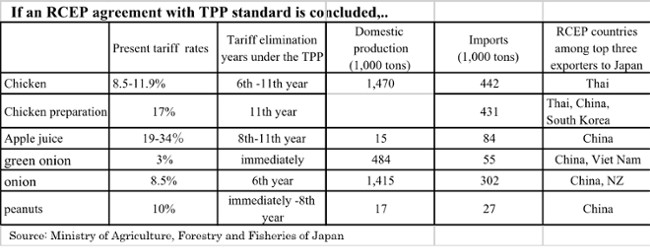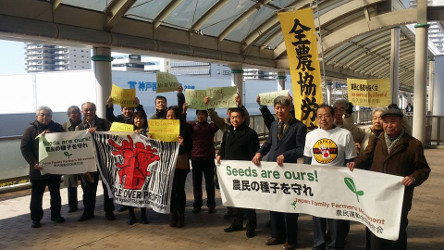Position Paper for the RCEP Kobe Round by Japan Family Farmers Movement
Farmers in Japan have a serious concern that the Regional Comprehensive Economic Partnership will damage small family farming and undermine the foundation of steadily feeding rising population in Asia. Under the liberalization policies promoted by national governments, the WTO, and various FTAs, small farmers already face hardship due to the influx of low-priced agricultural imports. Additional blow of liberalization by the RCEP will certainly accelerate the plight of farmers more unbearable.
After the Japan-U.S. Security Treaty in 1960, Japan’s major agricultural sectors were virtually “killed” by the major influx of wheat, soybeans, and feed grains from the United States, Canada, and Australia[i]. Although vegetables, fruits, and livestock products were selected as products of expansion, they have been under attack by imports from China and other Asian countries[ii]. The number of major regular farmers in Japan dropped by half from 3.46 million in 1985 to 1.77 million in 2015. Thus, the basis of agriculture has been remarkably weakened. For Japan, an RCEP agreement means concluding FTAs with China, Korea and New Zealand and surely affects the production of Japan’s farm products, which barely survived through previous liberalization (See Table at the end).
In ASEAN and other Asian countries, the WTO and FTAs have reduced and eliminated tariffs. Almost all tariffs in ASEAN have already been removed, and through FTAs between ASEAN and other countries, liberalization has been advancing. Asian farmers have already suffered a lot[iii].
Reports said RCEP member countries agreed that liberalization rate should be 80% 10 years after its coming into effect. This is above the rate of ASEAN-India FTA[iv]. Furthermore, if six non-ASEAN countries in RCEP have FTAs each other, the total number will be 15. Currently only 6 FTAs[v] are in effect. An RCEP agreement will add other 9 FTAs, and this will sharply facilitate liberalization in the region.
Moreover, we must be careful of the move to make the RCEP as high a standard as the TPP. Japan, Australia, and New Zealand have been struggling to make an RCEP agreement close to the TPP[vi]. The three countries shifted into full gear to revive the contents of the TPP in the RCEP. Particularly, the Abe government made clear that based on the TPP as a cornerstone, with ISDS and strong intellectual property rights, it will take the lead in negotiations of economic partnerships including the RCEP. The Japanese government is guilty in two meanings: one, it is sacrificing people’s livelihood and farming in Japan; second, it takes part in undermining people’s livelihood and farming in other Asian countries joining RCEP negotiations.
Together with agricultural liberalization, the issue of seeds is crucial for farmers.
According to leaked documents, in RCEP negotiations, Japan, South Korea, and Australia proposed a provision that obliges member countries to ratify the 1991 version of the International Convention for the Protection of New Varieties of Plants (UPOV 91). Currently, most farmers in other Asian countries do farming with farm-saved seeds[vii]. UPOV91 will restrict farmers’ rights on seeds, discourage traditional farming, and allow agribusinesses to control seed markets, thus threatening the very foundation of farmers’ farming and livelihood.
The move to allow agribusinesses to make profit from seeds is speeding up even here in Japan, which already ratified UPOV91. The Abe Cabinet on February 10 decided to abolish the Main Crop Seeds Act. The law was enacted to protect family farming born after the postwar agrarian reform. Under the law, prefectural research institutions have developed main crops such as rice, wheat/barley, and soybeans and stably provided low-priced seeds to farmers for the past 65 years. After its ratification of UPOV91, Japan revised the Plant Variety Protection and Seed Act to significantly strengthen plant breeders’ rights. However, the Main Crop Seeds Act and others have prevented agribusinesses from fully entering into the market and curbed price hikes of seeds. After the cabinet approval, farmers are worried about the infringement of farmers’ rights to seeds, higher seed prices, and the enclosure of farming production by seed companies, distributors, and restaurant industries.
United Nation’s High Level Panel of Experts on Food Security and Nutrition states, “There is an obvious need to increase total agricultural production in the time-path to 2050 when the world population is expected to reach its peak,” and shed light on the role of small farmers in the efforts to meet the need[viii].
At this moment, however, concerns are growing that an RCEP agreement will destroy farming and livelihood of small farmers, rob farmers of seeds, take food and food sovereignty away from people in Asia. We, farmers in Japan, hand in hand with farmers in Asia, will fight against a new move to destroy agriculture through the RCEP.

[i] Self-sufficiency rates are as follows: wheat (15%), soy beans (7%), and feed (28%)
[ii] Among livestock products, imports of chicken have flooded in from Asia.
[iii] Serikat Petani Indonesia (SPI) or Indonesian Peasant Union on December 15, 2016 issued a statement warning that domestic agricultural products are excluded from local markets by cheap imports, such as potatoes from China and Pakistan, carrots from China, Australia, and New Zealand, and spinach from China, Australia, and France. SPI says, “The free trade mechanism will be more strengthened by approval of RCEP leading to more distress.”
[iv] 76.5% on average. (Mizuho Insight, Sep. 1, 2014)
[v] Japan-Australia, Japan-India, India-South Korea, South Korea-Australia, (ASEAN-)Australia-New Zealand, New Zealand-China
[vi] Asahi Shimbun on December 11, 2016 reported from Indonesia where the 16th RCEP negotiation round was held that according to a negotiator Australia and New Zealand at the last day of the round proposed raising liberalization rates. The newspaper added, Southeast Asian negotiators said that after the TPP being difficult to come into force, some members including Japan and Australia started calling for the agreement of higher standard
[vii] According to the Asia Pacific Seed Association (APSA), farm-saved seeds account for 80-90% of all seeds in Asia
[viii] “Investing in smallholder agriculture for food security,” June 2013, The High Level Panel of Experts on Food Security and Nutrition of the Committee on World Food Security

